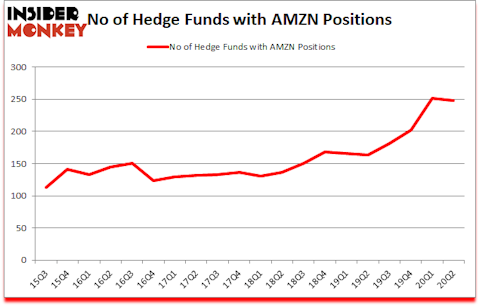Amazon.com, Inc. (NASDAQ:AMZN) has been among the top 10 hedge fund stocks for a very long time. For the last couple of years Amazon.com, Inc. (NASDAQ:AMZN) increased its popularity and found itself a place among the top 3 stocks, and it has been the top stock since the end of 2019 (see the 30 most popular stocks among hedge funds). The number of hedge funds with bullish Amazon positions jumped from 202 at the end of 2019 to 251 at the end of March. A small number of hedge funds decided to cash in during the second quarter, and the number of hedge funds that are betting on AMZN inched lower to 248 during the second quarter. Nevertheless, Amazon was still the #1 hedge fund stock by a large margin.
Today there are a large number of methods shareholders have at their disposal to appraise publicly traded companies. A pair of the less known methods are hedge fund and insider trading signals. Our experts have shown that, historically, those who follow the top picks of the top fund managers can outpace the S&P 500 by a significant margin (see the details here).

David E. Shaw of D.E. Shaw
At Insider Monkey we scour multiple sources to uncover the next great investment idea. Like Amazon, hedge fund sentiment towards Tesla reached its all time high at the end of 2019 and Tesla shares more than quadrupled this year. We are trying to identify other EV revolution winners, so we are checking out this under-the-radar lithium stock. We go through lists like the 10 most profitable companies in the world to pick the best large-cap stocks to buy. Even though we recommend positions in only a tiny fraction of the companies we analyze, we check out as many stocks as we can. We read hedge fund investor letters and listen to stock pitches at hedge fund conferences. You can subscribe to our free daily newsletter on our website to get excerpts of these letters in your inbox. With all of this in mind let’s take a look at the recent hedge fund action encompassing Amazon.com, Inc. (NASDAQ:AMZN).
What have hedge funds been doing with Amazon.com, Inc. (NASDAQ:AMZN)?
At the end of the second quarter, a total of 248 of the hedge funds tracked by Insider Monkey were bullish on this stock, a change of -1% from the first quarter of 2020. The graph below displays the number of hedge funds with bullish position in AMZN over the last 20 quarters. With hedgies’ capital changing hands, there exists an “upper tier” of notable hedge fund managers who were adding to their stakes considerably (or already accumulated large positions).

When looking at the institutional investors followed by Insider Monkey, Ken Griffin’s Citadel Investment Group has the most valuable call position in Amazon.com, Inc. (NASDAQ:AMZN), worth close to $8.7557 billion, amounting to 3.1% of its total 13F portfolio. On Citadel Investment Group’s heels is Fisher Asset Management, led by Ken Fisher, holding a $4.553 billion position; 4.4% of its 13F portfolio is allocated to the company. Some other members of the smart money that are bullish consist of Boykin Curry’s Eagle Capital Management, D. E. Shaw’s D E Shaw and Ken Griffin’s Citadel Investment Group. In terms of the portfolio weights assigned to each position VGI Partners allocated the biggest weight to Amazon.com, Inc. (NASDAQ:AMZN), around 29.92% of its 13F portfolio. NWI Management is also relatively very bullish on the stock, designating 22.14 percent of its 13F equity portfolio to AMZN.
Judging by the fact that Amazon.com, Inc. (NASDAQ:AMZN) has witnessed falling interest from the smart money, it’s safe to say that there is a sect of hedge funds who sold off their full holdings heading into Q3. Interestingly, Renaissance Technologies dropped the biggest investment of all the hedgies followed by Insider Monkey, comprising an estimated $376 million in stock. Josh Resnick’s fund, Jericho Capital Asset Management, also cut its stock, about $125.4 million worth. These transactions are important to note, as aggregate hedge fund interest was cut by 3 funds heading into Q3.
Let’s go over hedge fund activity in other stocks similar to Amazon.com, Inc. (NASDAQ:AMZN). These stocks are Alphabet Inc (NASDAQ:GOOGL), Alphabet Inc (NASDAQ:GOOG), Facebook Inc (NASDAQ:FB), Alibaba Group Holding Limited (NYSE:BABA), Berkshire Hathaway Inc. (NYSE:BRK-B), Visa Inc (NYSE:V), and Johnson & Johnson (NYSE:JNJ). This group of stocks’ market caps resemble AMZN’s market cap.
| Ticker | No of HFs with positions | Total Value of HF Positions (x1000) | Change in HF Position |
|---|---|---|---|
| GOOGL | 157 | 13533499 | -10 |
| GOOG | 144 | 14761874 | -3 |
| FB | 210 | 25222524 | -3 |
| BABA | 154 | 24386257 | -13 |
| BRK-B | 107 | 15633556 | -8 |
| V | 154 | 17010420 | -3 |
| JNJ | 94 | 4731250 | 12 |
| Average | 145.7 | 16468483 | -4 |
View table here if you experience formatting issues.
As you can see these stocks had an average of 145.7 hedge funds with bullish positions and the average amount invested in these stocks was $16468 million. That figure was $43218 million in AMZN’s case. Facebook Inc (NASDAQ:FB) is the most popular stock in this table. On the other hand Johnson & Johnson (NYSE:JNJ) is the least popular one with only 94 bullish hedge fund positions. Compared to these stocks Amazon.com, Inc. (NASDAQ:AMZN) is more popular among hedge funds. Our overall hedge fund sentiment score for AMZN is 99.6 (out of 100). Stocks with higher number of hedge fund positions relative to other stocks as well as relative to their historical range receive a higher sentiment score. Our calculations showed that top 10 most popular stocks among hedge funds returned 41.4% in 2019 and outperformed the S&P 500 ETF (SPY) by 10.1 percentage points. These stocks returned 29.2% in 2020 through October 16th but still managed to beat the market by 19.7 percentage points. Hedge funds were also right about betting on AMZN as the stock returned 18.6% since the end of June (through 10/16) and outperformed the market by an even larger margin. Hedge funds were clearly right about piling into this stock relative to other stocks with similar market capitalizations.
Follow Amazon Com Inc (NASDAQ:AMZN)
Follow Amazon Com Inc (NASDAQ:AMZN)
Receive real-time insider trading and news alerts
Disclosure: None. This article was originally published at Insider Monkey.



